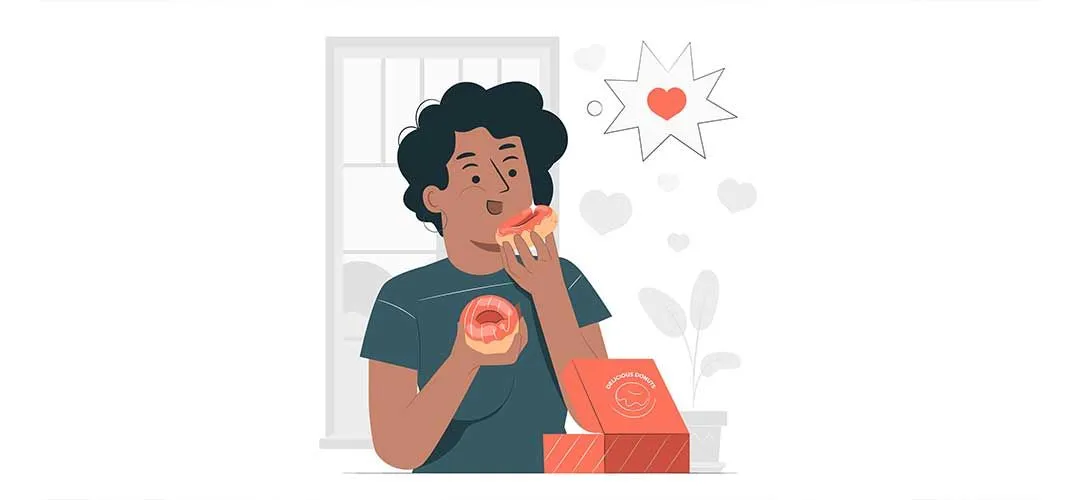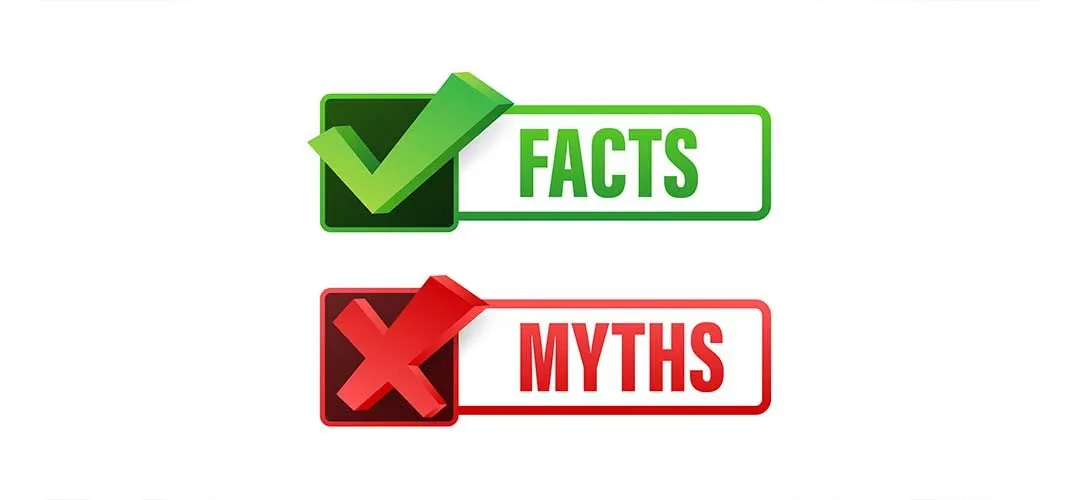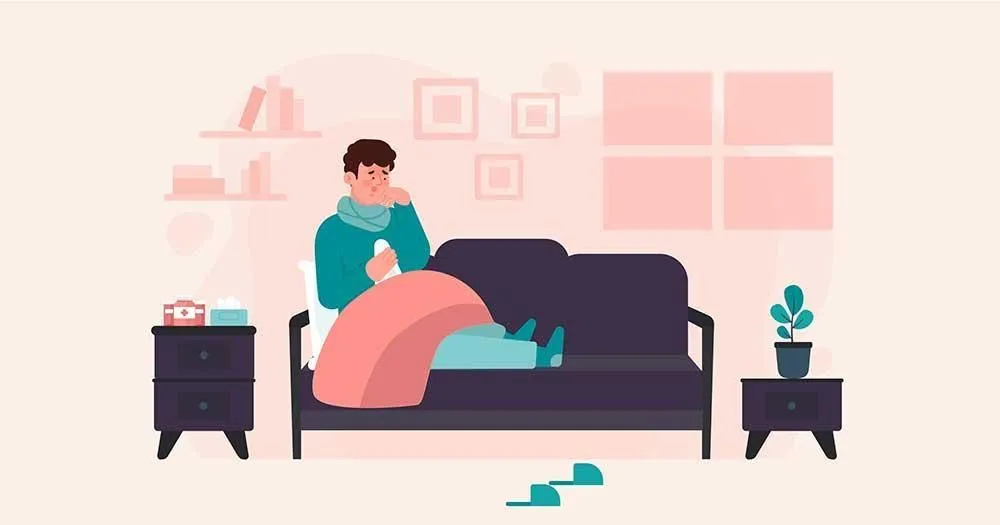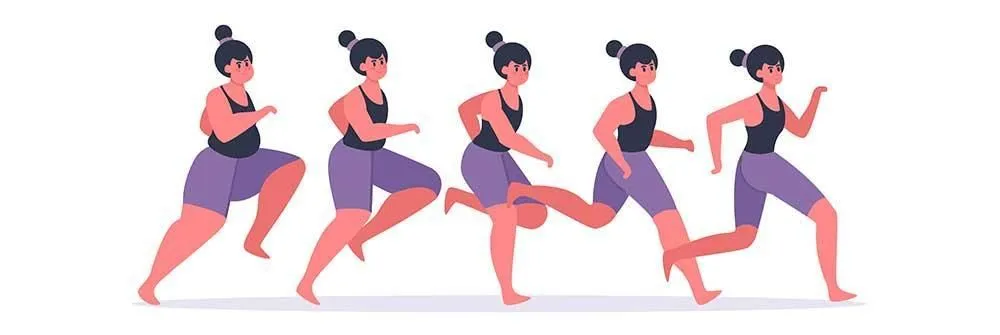Unexplained weight gain or weight loss mostly results from improper eating habits and an inappropriate lifestyle. This can be attributed to several factors like pollution, stress, genetics, indulgent eating habits, and lack of fitness. However, it is equally important to stay away from several myths and misconceptions that may make the issue of weight management worse.
Everybody has a few bad habits and they might stop you from shedding those extra pounds. Your first step should be to find out what these bad habits are so you can create an effective plan to eliminate them. We are busting some of the most common myths about unwanted weight gain (or weight loss) and this blog post is all about how you can start looking your absolute best.
Some people can put on some extra fat quicker as compared to others. They could have some indulgent habits like eating sweets or drinking cola drinks or simply being a couch potato. All these may become worse if you are an emotional eater, or are depressed, or are under stress because such behavior can only lead you to worse.
We’ve combined the most common reasons why you may not be able to lose enough weight, no matter how hard you try:
Getting too many of your daily calories from carbs (especially from simple sugars) and fats is one of the most common ways people sabotage their weight loss efforts. Your body takes twice as long to digest proteins as compared to carbs, thus making you feel fuller and satiated for longer.
Tip: Here are some easy ways to sneak protein into every meal and drink. We’re sure you would like to try them!
Protein consumption stabilizes blood sugar levels and reduces cravings. Some great sources of protein include lean beef, poultry, fish, eggs, Greek yogurt, cottage cheese, nuts and nut butter, protein powder, whole grains such as quinoa, and collard greens.
How is a lack of sleep connected to unexplained weight gain or weight loss? Well, here’s the deal- if you’re not getting enough sleep, you will have a lot of trouble trying to shed that extra fat. This is partly due to the suppression of two hormones called leptin and ghrelin that work together to help you eat.
Leptin stimulates the feeling of satiation during a meal and tells you when you’re full. Ghrelin increases your appetite and helps you eat until your energy levels are met with an intake of food. Researchers at the University of Chicago have found that not getting enough sleep changes the balance between the two hormones
Note: This can also lead you to crave sugary snacks during late-night hours, thus increasing belly fat.
When you try to suddenly cut off something from your habits, you crave them even more with time. It is true for your eating habits too. Your diet may be going fantastic right now but like with most people, there will come a point when you will want to call it quits and indulge in your favorite unhealthy foods.
Many people think that they have to give up what they love when they’re on a certain diet. This often means that they have to turn away from carbs, sugar, gluten, dairy, or fatty foods. Nutritionists advise against making knee-jerk reactions and changes to your eating habits, and rather cutting off the indulgent foods slowly so your body gets time to acclimatize.
Tip: Here’s how to snack on junk food and still not get fat!
We have all been grazing since we were kids. We would open the fridge every time we pass it and graze the fridge, have a slice of that cake here, and have a spoon of Nutella there and maybe a cookie or two. The same goes for drinking sugary cola drinks or even alcoholic beverages, even if they are in a small quantity every day.
Such indulgent habits can weaken your metabolism. You might have consumed several extra calories which can add up if you do it every day. It’s better to plan your meals and avoid snacking unnecessarily before you get a potbelly.
Eating while browsing the internet, driving, going through your Instagram feed, or watching television may cause you to overeat. The solution to faster weight gain is to stop eating when you’re focusing on other things or stop getting distracted while you eat.
This is why it is important to eat slowly so that you can enjoy and respect the nutrients in your food. Chewing more triggers the brain to think that you are eating more, allowing you to eat less than you normally would. This can help you reduce some belly fat faster.
Thirst means you are dehydrated. About 70 percent of your body is water and you should drink 8 or more glasses of water per day to replenish yourself internally. It would also help your digestive system drive out the toxins from your body faster.
When you’re dehydrated, you might also feel hungry. So instead of reaching out for a snack, have a glass of water and see if you feel better. You may carry a bottle of water with you so that you are hydrated throughout the day. Drinking plenty of water will also ensure you don’t eat too much during your meals, a factor that can help you accumulate less fat.
Even if you exercise intensely every day, you need to focus on what you put in your body. Exercise is a way to burn some extra calories, tone, and condition your muscles and improve your cardiovascular health. The benefits of exercise are countless, but they cannot replace a healthy diet.
It would also help you to resist your temptation or addiction to food. If you stop rewarding yourself each day with unhealthy food, it would make space for healthier calories for your sweat sessions.
Fact: ‘Starvation Response’ is a term for a reduced rate of metabolic activities and organ functions. It occurs when the intake of food is drastically reduced or eliminated over many days and weeks.
This is vastly different from fasting. If you skip a meal or observe a fast, your body would not go into starvation mode. Digestion uses about 10% of the daily calories in 24 hours, and it also gives the digestive system for some much-needed rest.
Caution: Abnormal eating habits cause a slight decrease in calorie usage and more time is taken to break the food down. During true starvation, this decreased need for calories is provided to the body by the breakdown of fat and muscle tissues.
Fact: No, but the reverse may be true. A dramatic restriction of carbohydrates may drop a few pounds off your body but it can lead to long-term health issues.
Carbohydrates can hold more water than other energy sources. A drastic restriction will cause a temporary loss of weight due to a loss of water and may even lead to dehydration.
There is no loss of body fat from these diets, which is the main objective of weight loss. To lose one pound of fat (or about 3500 calories), one should either eat fewer calories or use more energy from exercise.
Carbohydrates are an essential source of energy for the body and should not be eliminated.
Fad diets do not ultimately succeed, as they are not in keeping with the way the human body functions. With this type of diet, it is common to increase fat intake as a result of the decreased levels of carbohydrates, with the fat
contributing far more calories.
Individuals can also find themselves becoming tired, as the primary energy source of the body, carbs, has been restricted. Water in the body is tightly regulated and will eventually return to normal levels, and with that, the weight itself will return.
Fact: Thyroid problems and their metabolic effects are uncommon except for women over 60. Obesity itself is what causes changes in hormones called Ghrelin and Leptin. These hormones are produced in the overweight or obese person but the cells of the body become resistant or insensitive to their effects.
Suggested article: Should thyroid patients eat every 2 hours for weight loss?
The result of this is:
1.Muscle tissues make up 35% of a woman’s body and 45% of a man’s body. Improper thyroid makes these tissues resistant to insulin, thus causing diabetes.
2.Any unused glucose in the food is also converted to body fat, thus causing obesity and potbelly.
3.The job of ghrelin is to let you know that there isn’t any more energy in the blood for the functions of the body and thus you should eat something. If you don’t eat, your body will consume its muscle tissues and that’s bad.
4.The job of leptin is to tell you that you have eaten enough for your needs and that you should stop. Overweight persons usually do not get these signals correctly and this may make them prone to eating more.
Fact: Gluten is the protein found in grains. While a very small percentage of the population is allergic to this protein, there is no negative effect on everyone else. The protein in plant-based foods is incomplete because it lacks all the amino acids to maintain muscle tissue. So it must be combined with a different plant-based protein.
It may be unnecessary to eliminate gluten from the diet. It could be worse for those who are vegans or don’t consume enough protein from animal sources to supply sufficient dietary protein. It is so because the muscles of the body will have no fuel to boost the normal growth of cells with lean body mass.
Here are some of the most commonly asked questions that people ask healthcare experts about unexplained weight gain or weight loss:
Does Allegra cause weight gain?
Antihistamines or anti-allergy medicines like Allegra may affect your metabolism rate and cause unexplained weight gain. They may also cause other medical complications so it is best to take them only as per a healthcare expert’s prescription.
Can omega 3 fatty acids cause weight gain?
Derived from fish, omega-3 fatty acid can cause weight gain when taken in excess because it is rich in fat and calories.
How to gain weight in 5 days?
It is impossible to gain a considerable amount of weight in 5 days. Doctors advise that you cannot gain or lose a measurable amount of weight in such a small time, and you should not eat any medicine that promises this.
Can testosterone injections cause weight gain?
Yes, but only initially. Hormone injections like testosterone are given to reduce weight in someone’s body. But they may cause some weight gain due to reactions in biological processes like water retention.
What drugs cause weight gain?
There are several illnesses whose medications can cause unexplained weight gain in some cases. These illnesses are diabetes, mental illness, antidepressants, steroid (for bodybuilding), blood pressure, and post-pregnancy care.
What is the average weight gain in pregnancy?
This depends on your lifestyle, dietary habits, cultural preferences, and complications in pregnancy. However, on average, the change in weight is proportional to the weight of the baby. You should gain between 11 to 28 pounds during the process as per your BMI.
Does cortisol cause weight gain?
Nothing is worse than stress. Cortisol or stress hormone increases the metabolism rate and causes you to eat more to cover for the loss of blood sugar levels. Since our mind cannot differentiate between real and perceived danger, it conditions itself to eat foods that are rich in fats and sugars to make up for the lost energy. This causes rapid weight gain.
Do antidepressants cause weight gain?
Yes but every medication (even for depression or mental disorders) reacts differently to different people. In some cases, it may cause irregular fat gain or loss. It is better to consult your doctor before taking any medicine.
Xanax is one of the best medicines for anxiety and mental issues. This antidepressant may cause lethargy and weakness, and this may lead a person to inactivity. This can cause him or her to gain weight.
Why do you gain weight when you quit smoking?
Smoking is directly related to the consumption of nicotine. When someone quits it, the relapse causes a weaker and slowed metabolism. This can cause a rapid weight gain or loss in some cases.
Can you gain weight before your periods?
Hormonal changes can cause weight gain and menstrual changes like periods can affect hormones. During periods, estrogen and progesterone increase water retention, thus causing weight gain.
Can there be weight gain due to birth control or pills?
Yes, but it is rare and not easy to gain weight due to birth control. Taking pills to control the birth rate should always follow a doctor’s prescription.
Is it possible to gain weight during quarantine?
Due to COVID-19 restrictions, you might be in quarantine. If you become lethargic, stop exercising or meditating, and start eating fatty and oily foods, you can gain weight during isolation.
“I am working out but still gaining weight in my stomach.”
It is possible that you are not working out to your full potential or that you have hit a weight loss plateau. Either way, consult your fitness trainer (or a personal trainer online) to get rid of this unwanted weight gain (or belly fat).
Does carbonated water cause weight gain?
Carbonated or sprinkled water cannot cause any weight gain or loss on its own. But some manufacturers may add sugars and calories to their soda water, and this can cause unwanted weight gain.
Does drinking alcohol make you gain weight?
Yes, it can, because alcohol only contains empty calories. If you take five drinks a month for a year, you can gain 1.6 pounds of weight.
How many calories a day to gain weight?
You should add 300 to 500 calories for building muscle mass in a linear and well-calculated manner.
Can steroids cause weight gain?
Steroids slow down your metabolism rate. This causes disturbances in how your body processes your food and converts it to energy, muscles, and fat. Steroids may thus cause you to eat more and become fat. Their prolonged use may also hurt your liver.
How are depression and weight gain related?
Depression affects everyone differently. It may cause someone to lose or gain weight, because a person may either develop an aversion or love for food in this case. It all depends on his outlook.
Is there any sudden weight gain during perimenopause?
With dropping estrogen levels during the perimenopause and early post-menopause phase, some women may experience some weight gain. Young women may accumulate more flab on their lower body while older (or postmenopausal) women can get more belly fat.
It usually takes about eight weeks to lose some weight, provided one starts to work out and eat a balanced diet every day. One should focus on first melting the excess flab on the belly, thighs, and arms before choosing to go for lean muscles. Contacting a fitness expert would help too.
It usually takes a great deal of time, patience, persistence, and hard work to gain or lose weight as per one’s will. We recommend you follow the tips and tricks offered on our blog and make a positive decision based on the same.
For more insight, download the Mevo App for your Android smartphones and iPhones.





